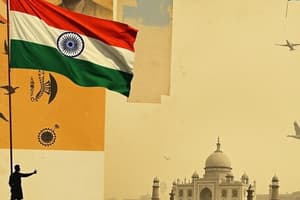Podcast
Questions and Answers
What was the impact of British colonial rule on the South Asian subcontinent?
What was the impact of British colonial rule on the South Asian subcontinent?
- Isolation from the world capitalist market
- Promotion of traditional cultural practices
- Emphasis on maintaining existing political structures
- Introduction of modern technology and governance structures (correct)
What was the significance of the nationalist movement for independence in India?
What was the significance of the nationalist movement for independence in India?
- It defined modern Indian society and contributed to its new identity (correct)
- It had minimal impact on national and regional identities
- It aimed to uphold colonial governance structures
- It focused solely on political struggles
What was the focus of the reformers in the context of colonial-modern influences?
What was the focus of the reformers in the context of colonial-modern influences?
- Rejecting all modern influences in favor of tradition
- Negotiating between inherited traditions and colonial-modern influences (correct)
- Embracing colonial-modern influences without negotiation
- Isolating themselves from colonial-modern influences
What was the aim of politically oriented individuals in the context of representing India?
What was the aim of politically oriented individuals in the context of representing India?
What groundwork did colonial rulers lay extensively?
What groundwork did colonial rulers lay extensively?
Flashcards are hidden until you start studying
Study Notes
Impact of British Colonial Rule on South Asia
- Established a centralized bureaucratic system, altering local governance structures.
- Imposed economic policies that led to the deindustrialization of local industries and promoted cash crops, harming traditional agriculture.
- Introduced new education systems which emphasized Western ideals, affecting indigenous knowledge and languages.
- Increased infrastructure development, including railways and telecommunication, primarily serving colonial interests.
- Deepened social divisions and tensions, contributing to communal strife among different ethnic and religious groups.
Significance of the Nationalist Movement for Independence in India
- Emerged as a response to colonial oppression, unifying diverse groups under a shared goal.
- Leaders such as Mahatma Gandhi promoted non-violent resistance, gaining widespread national and international support.
- Fostered a sense of Indian identity and cultural pride, countering British narratives.
- Mobilized mass participation, including the involvement of women and rural communities in the struggle for independence.
- Resulted in significant legislative changes towards the end of colonial rule, establishing political awareness and engagement among citizens.
Focus of Reformers in Colonial-Modern Influences
- Aimed to modernize society while balancing traditional values, advocating for social and educational reforms.
- Promoted women's rights and social justice, challenging practices like sati and child marriage.
- Encouraged self-reliance through initiatives like the Swadeshi movement, emphasizing indigenous goods and industries.
- Engaged with Western ideas of democracy and rationalism, incorporating them into a reformed vision of Indian society.
Aim of Politically Oriented Individuals in Representing India
- Sought to articulate the needs and aspirations of the broader Indian population to colonial authorities.
- Worked to create a political framework advocating for self-governance and greater autonomy.
- Strived to highlight the economic and cultural contributions of India to counter British narratives.
- Formed alliances across various sects and communities to build a unified front against colonial rule.
Groundwork Laid by Colonial Rulers
- Established key administrative institutions that continued to influence governance post-independence.
- Implemented legal systems that transformed the judiciary, affecting law and rights in India.
- Introduced modern education and communication methods, influencing future generations.
- Created a transport and communication network that facilitated trade but also deepened colonial control.
Studying That Suits You
Use AI to generate personalized quizzes and flashcards to suit your learning preferences.




